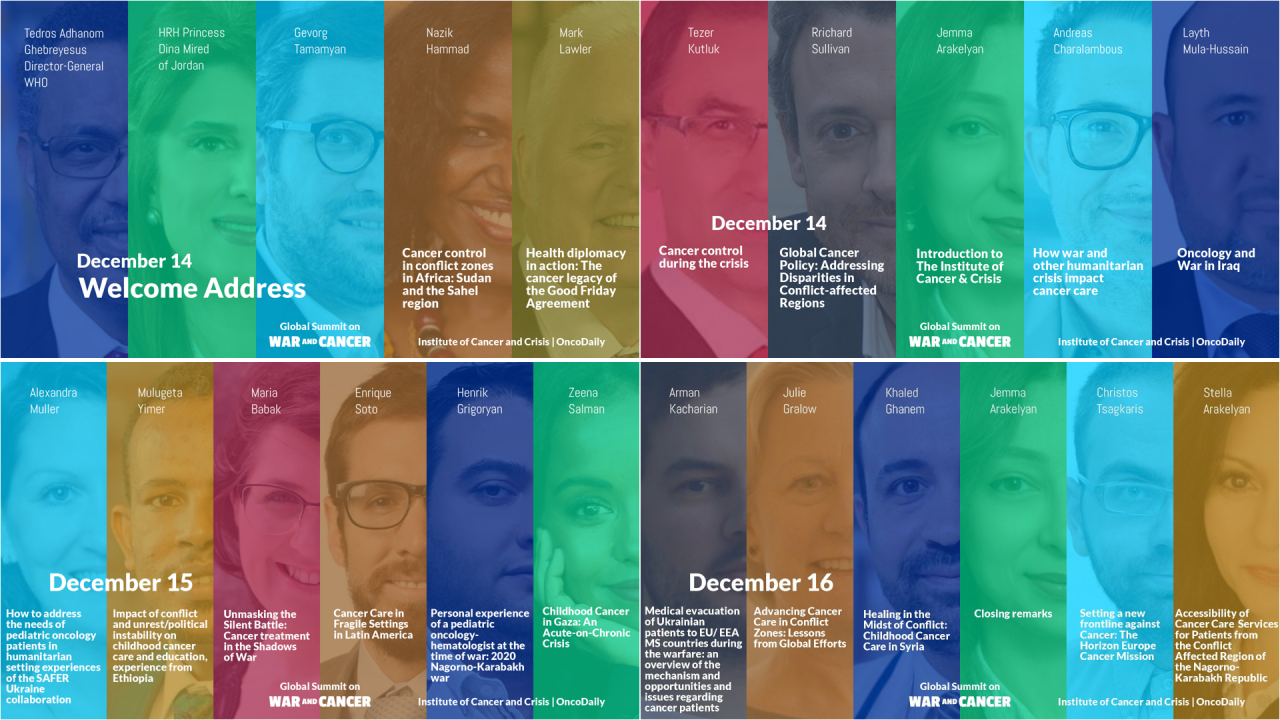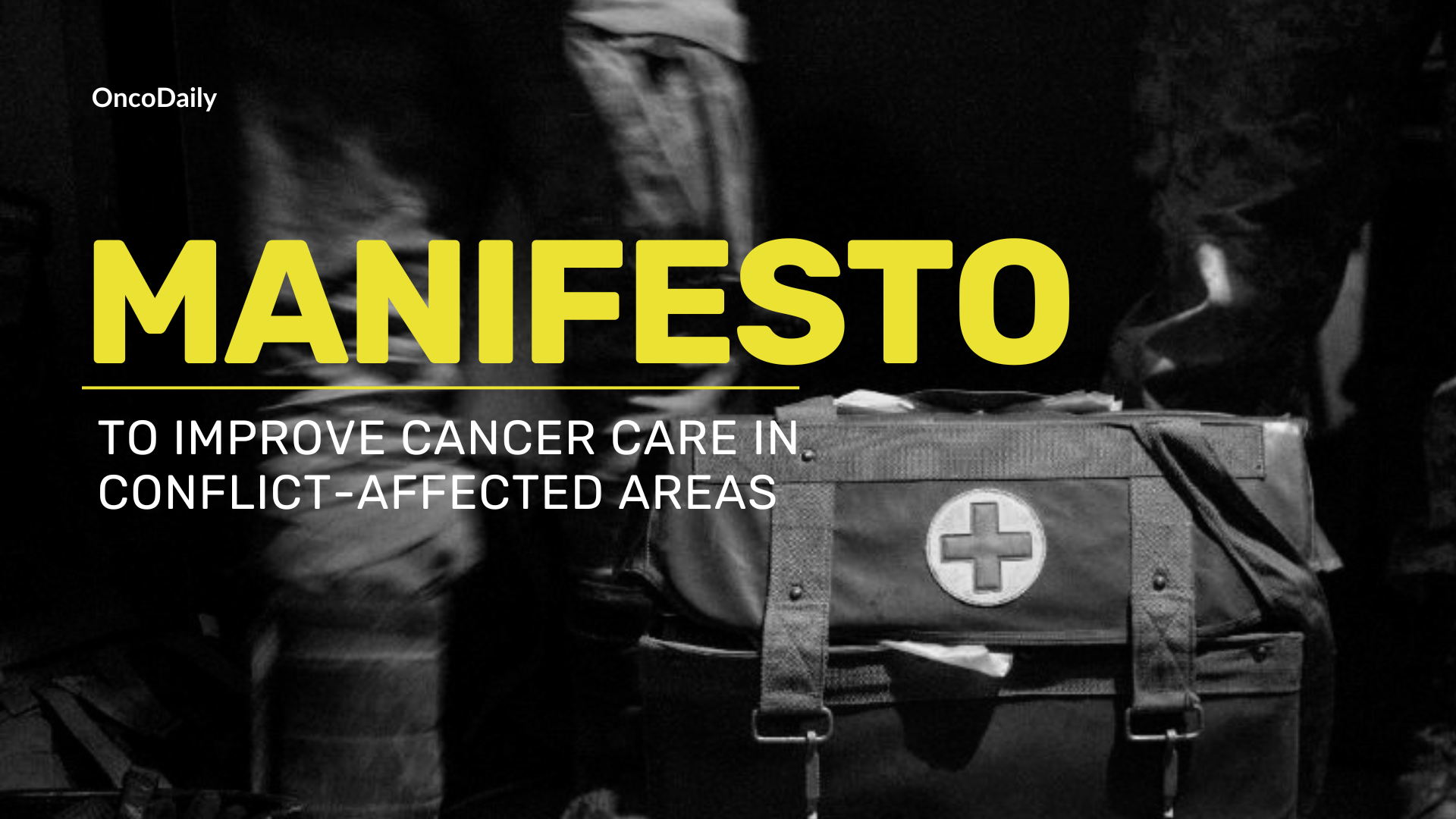Press Release
First Global Summit on War and Cancer Develops Key Manifesto to Improve Cancer Care in Conflict-Affected Areas
Increasingly, as wars across the world continue to escalate, cancer patients face an ever-growing series of urgent challenges in conflict-affected regions, falling victim to the collateral damage of war on hospitals, on the healthcare supply chain and the on massive displacement of patients that war induces. Recognizing these challenges, the first Global Summit on War and Cancer, organized by the Institute of Cancer and Crisis and OncoDaily from December 14-16, 2023, brought together leading experts to address the challenges of providing cancer care in conflict-impacted regions.
The summit culminated in the development of a key manifesto, published in The Lancet, with seven crucial recommendations aimed at improving cancer care in these challenging settings.
- Respect for the Geneva Convention: Advocate for the strict adherence to the Geneva Convention to protect medical personnel, prohibit attacks on medical units, and safeguard the rights of sick individuals, including those with cancer.
- Inclusion in Political Agendas: Promote the inclusion of cancer and other non-communicable diseases (NCDs) in humanitarian settings on the political agendas of the United Nations, including the upcoming fourth high-level meeting on NCDs.
- WHO Working Group: Establish a working group through the World Health Organization (WHO) comprising key non-state actors to define, support, and monitor approaches to maintain cancer care in conflict-impacted populations, including through research initiatives.
- Inclusive Care Strategies: Advance inclusive strategies and care models for cancer patients in humanitarian settings, addressing the complexity of cancer diseases, palliative care needs, and the distinct requirements of different age groups, including children with cancer and blood disorders.
- Context-Specific Strategies: Develop and implement context-specific strategies for delivering better cancer care in conflict-impacted populations by establishing online coordination platforms, blended financing mechanisms, and technical support priorities.
- Biannual Reports: In cooperation with main stakeholders, publish biannual reports on the state of cancer care in conflict-impacted regions, including progress updates, emerging best practices, and recommendations, and incorporate these into relevant WHO reports, such as the WHO Global Status Report on Cancer 2025.
- Cancer Care in Emergency Response: Establish cancer care as a core pillar of emergency response plans in all conflict settings and advocate for investments in cancer services to promote access, rebuild infrastructure, and coordinate workforce capacity-building through international cooperation.
Authors: Tedros Adhanom Ghebreyesus, Dina Mired, Richard Sullivan, Alexandra Mueller, Andreas Charalambous, Arman Kacharian, Christos Tsagkaris, Enrique Soto-Perez-de-Celis, Henrik Grigoryan, Julie Gralow, Andre Ilbawi, Khaled Ghanem, Layth Mula-Hussain, Bente Mikkelsen, Mulugeta Yimer, Nazik Hammad, Stella Arakelyan, Tezer Kutluk, Zeena Salman, Mark Lawler, Gevorg Tamamyan, Maria V Babak, and Jemma Arakelyan (contact: [email protected])
Commenting on the Manifesto, the authors shared:
Dr Tedros Adhanom Ghebreyesus, the Director-General of the World Health Organization (WHO):
“Cancer doesn’t stop during humanitarian emergencies, but ensuring continuity of cancer care is extremely challenging when health systems and services break down during conflict and other crises. In February this year, WHO hosted a global meeting on non-communicable diseases in humanitarian settings in Copenhagen, drawing attention to the need to build resilient health systems that can deliver essential services for cancer and NCDs, even in the most difficult circumstances. This Manifesto builds on that meeting and provides concrete recommendations on how to address the ramifications of armed conflict on cancer care, control and prevention.”
Senior Author Jemma Arakelyan, CEO at the Institute of Cancer and Crisis:
“The Manifesto emphasizes the urgent need for international collaboration to develop and deliver specific cancer care services in acute humanitarian emergencies and protracted conflict settings, as well as supporting the implementation of pragmatic research to improve the understanding of patient needs and provide guidance for the design of specific care models.”
Her Royal Highness Princess Dina Mired of Jordan, the Honorary President of the European Organization for Research and Treatment of Cancer (EORTC), Patron of the International Society of Paediatric Oncology (SIOP) and Past President of the Union for International Cancer Control (UICC):
“We urge all stakeholders to come together to make this manifesto a reality. Cancer patients have long been ignored in conflict settings and now with the current situation for cancer patients in Gaza for example the situation has manifested itself in its extreme form. Cancer patients have been dealt a further blow when the total health infrastructure including health care personnel was targeted and decimated. The global health community, as first line defenders of health and well-being for all, should collectively voice their solidarity in the strongest of terms for the sanctity and protection of health services, as well as for the establishment of clear cancer care models to protect cancer patients during any conflict.”
Prof. Mark Lawler, Professor of Digital Health at Queen’s University Belfast, co-chair of the newly established European Cancer Organisation’s Special Network on Emergencies and Crises:
“Conflict and complex emergencies impact cancer patients in different ways and must be addressed urgently. The recent barbaric attack on the Okhmatdyt Hospital, the largest children’s cancer treatment centre in Ukraine emphasises the enormous damage that war can wreak on cancer patients and cancer health systems. Our 7 point Manifesto recognises that context-specific solutions will be required across different settings.
Exemplars such as the Ireland – Northern Ireland – US National Cancer Institute Consortium emphasise how international collaboration can empower delivery of the health dividend of peace. Although there is still much work to be done, there is now political willingness and engagement from the wider community to serve this critically-underserved cancer population. We will not waiver from supporting cancer patients in conflict-affected regions of the world. If we do not act as a matter of urgency, many more innocent victims will die”
The Manifesto recognizes that improving cancer care in conflict requires strengthening the health systems of conflict-affected countries, promoting knowledge exchange and prioritizing research, empowering multilevel cooperation between stakeholders, as well as mobilizing resources in the face of many competing demands.
The correspondence detailing these recommendations is due to embargo at 23:30 UTC+1 on 1st August in The Lancet.

